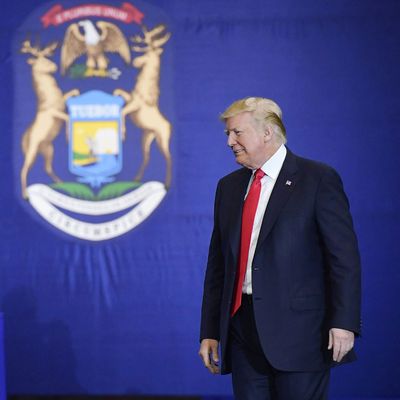
As one of the three Rust Belt states that narrowly went for Donald Trump in 2016 and tilted the Electoral College to the underdog, Michigan is understandably of great interest to the 45th president. Accordingly, he has been especially heavyhanded in intervening in that state’s August 7 Republican primary. He endorsed gubernatorial candidate (and Attorney General) Bill Schuette for governor last September (though misspelling the candidate’s name in tweeting his praise), which was apparently a reward for Schuette sticking with Trump after the Access Hollywood video was released, even as Lieutenant Governor Brian Calley, now Schuette’s chief GOP gubernatorial rival, called for the mogul to drop out of the presidential race. He doubled down on the attorney general at a Michigan MAGA rally this April, and his favorite looks likely to cruise to victory in the primary.
More recently, Trump big-footed it into a close Senate primary in which both candidates had sung frequent hymns of praise to POTUS:
It’s less clear how Trump made this choice, though perhaps he thought having an adulatory African-American ally would be helpful when indulging in race-baiting. In any event, the presidential endorsement seems to have broken the primary contest open for James.
But if Trump seems to own Republican primaries in this as in other states, that’s not to say his embrace of the Michigan GOP is going to pay off in November.
Democrats have their own very vibrant gubernatorial primary, featuring longtime front-runner (and party Establishment favorite) Gretchen Whitmer, a former Democratic legislative leader; former Detroit health director Abdul El-Sayed, who is very much running in the Bernie Sanders lane; and self-funding scientist and entrepreneur Shri Thanedar. A big national buzz has developed over El-Sayed’s campaign and persona; the 33-year-old former Rhodes Scholar is right out of central casting to become the next Alexandria Ocasio-Cortez.
Whitmer is considered a likely favorite over Schuette in the most likely November matchup, if only because two-term incumbent GOP governor Rick Snyder is very unpopular (he hasn’t shaken responsibility for the Flint water scandal, among other things). Of equal importance, Snyder’s 35/50 approval ratio in Michigan is only marginally worse than Trump’s 44/52. And that’s based on Morning Consult’s relatively sunny picture of Trump’s standing in Michigan: NBC News/Marist recently pegged Trump at 36/54.
An upset in the Democratic gubernatorial primary would shuffle the deck, though Thanedar’s money and El-Sayed’s charisma and youth support could make either of them formidable as well. And while John James is an intriguing Senate candidate, Debbie Stabenow has consistently held her own in polls and fundraising. The Cook Political Report rates her race as Likely Democratic.
Michigan is also a major target in the Democratic drive to win the House. In the southeast Michigan 8th Congressional District, very narrowly carried by Trump, sophomore representative Mike Bishop is in a tossup race against likely Democratic nominee Elissa Slotkin, a former CIA agent with Iraq experience and also high-ranking White House and Pentagon service in both the Bush and Obama administrations. The suburban 11th District is another marginal GOP seat with no incumbent; big fields in both party primaries make this district hard to call (perhaps the best-known Republican is former accidental congressman Kerry Bentivolio, who won the seat after Thad McCotter abruptly resigned; and the best-known Democrat could be Suneel Gupta, brother of doctor and CNN personality Sanjay Gupta.
Beyond these two swing districts, there are no fewer than three other Republican-held House seats that could become vulnerable if a serious Democratic wave develops: the Northern Michigan/Upper Peninsula 1st District, represented by Jack Bergman, an area that some have compared to the southwest Pennsylvania district won in a special election by Democrat Conor Lamb earlier this year; the much more traditionally marginal southwest Michigan 6th District, where longtime incumbent Fred Upton may have made himself vulnerable with key pro-Trump votes; and the southeast Michigan 7th District, where incumbent Tim Walberg faces a rematch with Democratic state legislator Gretchen Driskell.
The odds are low that Michigan is going to be a big Trump success story in 2018; it’s more likely to provide Democratic headlines, and plenty of fodder for evaluating the extent to which Republican administrations in Washington and in Lansing have disappointed their voters. That Michigan’s GOP is distinguishing itself as a Trump stronghold makes it all the more likely that his influence will be heavy up and down the ballot.






























